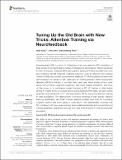Tuning Up the Old Brain with New Tricks: Attention Training via Neurofeedback
Author(s)
Jiang, Yang; Abiri, Reza; Zhao, Xiaopeng
DownloadTuning up the old brain.pdf (1.271Mb)
PUBLISHER_CC
Publisher with Creative Commons License
Creative Commons Attribution
Terms of use
Metadata
Show full item recordAbstract
Neurofeedback (NF) is a form of biofeedback that uses real-time (RT) modulation of brain activity to enhance brain function and behavioral performance. Recent advances in Brain-Computer Interfaces (BCI) and cognitive training (CT) have provided new tools and evidence that NF improves cognitive functions, such as attention and working memory (WM), beyond what is provided by traditional CT. More published studies have demonstrated the efficacy of NF, particularly for treating attention deficit hyperactivity disorder (ADHD) in children. In contrast, there have been fewer studies done in older adults with or without cognitive impairment, with some notable exceptions. The focus of this review is to summarize current success in RT NF training of older brains aiming to match those of younger brains during attention/WM tasks. We also outline potential future advances in RT brainwave-based NF for improving attention training in older populations. The rapid growth in wireless recording of brain activity, machine learning classification and brain network analysis provides new tools for combating cognitive decline and brain aging in older adults. We optimistically conclude that NF, combined with new neuro-markers (event-related potentials and connectivity) and traditional features, promises to provide new hope for brain and CT in the growing older population.
The ability to focus attention, encode and maintain information are among the brain’s most important cognitive functions. Attention is a central component of cognitive ability. Measurements of neural activity have become strong predictors of cognitive impairments in persons afflicted with various kinds of cognitive deficits. Lapses in attention can impair memory and behavioral performance.
Complaints about declined attention and memory are common in healthy and cognitively intact older adults during brain aging. Deficits in attention and memory are also the most common symptoms in older adults with dementia such as Alzheimer’s disease (AD), Parkinson’s, or vascular dementia (VD). Old-age dementia affects patients’ daily lives with memory loss and cognitive impairments. The most common early symptoms of AD are problems with short-term memory (Reiman et al., 2011). Since there is no effective drug treatment thus far to stop cognitive decline, attention training has become an increasingly attractive option. The effectiveness of cognitive rehabilitation including attention training has been under debate for decades. A recent review has shown evidence that attention training enhances attention and memory with moderate success (Cicerone et al., 2011). Since attention is a core function for multitude of cognitive processes (e.g., memory and perception), most cognitive training (CT) programs seek to increase the existing attentional capacity.
Date issued
2017-03Department
Massachusetts Institute of Technology. Institute for Medical Engineering & ScienceJournal
Frontiers in Aging Neuroscience
Publisher
Frontiers Research Foundation
Citation
Jiang, Yang; Abiri, Reza and Zhao, Xiaopeng.“Tuning Up the Old Brain with New Tricks: Attention Training via Neurofeedback.” Frontiers in Aging Neuroscience 9 (March 2017): 52 © 2017 Jiang, Abiri and Zhao
Version: Final published version
ISSN
1663-4365
